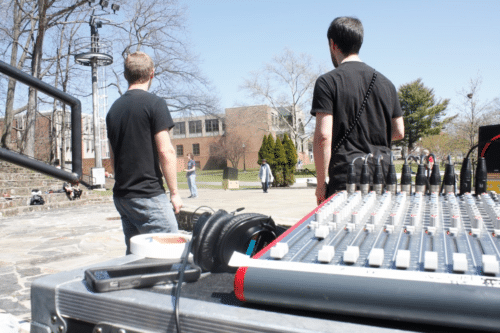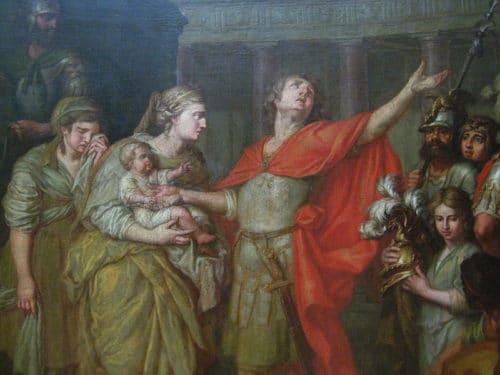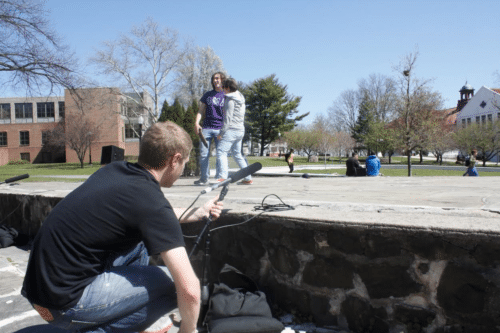Many of us learn about the Trojan War in our years at Montclair State University through our general humanities graduation requirement, but the aftermath of the legendary 10-year war is something that few undergrads encounter in their brief liaison with Classical mythology. This week, however, the Montclair State University Greek Theatre Group is shedding light on what can happen to those at the margins during wartime and how war can impact society at large in its production of Euripides’ “Andromache.”
Originally performed in the 420s BCE, “Andromache” tells the story of the family members of the main characters of Homer’s “Iliad”: the Trojan prince Hector and the nearly-invincible Greek warrior Achilles.
By the time the play takes place, these two famous heroes have both died in battle, leaving behind their families to deal with the consequences of the Trojan War as survivors. The play focuses on the household of Achilles’ son Neoptolemus, who returned home after the war with Hector’s enslaved wife Andromache as his concubine. Neoptolemus’ wife, Hermione, is jealous of his relationship with Andromache, leading the former Trojan royal to flee to the temple of Thetis, a sea nymph (who also happens to be Neoptolemus’ grandmother), for safety against her master’s enraged wife.
If you’re already confused, you’re not alone. “Andromache” relies on foreknowledge of complex relationships between characters that would have been common religious knowledge for the ancient Athenian viewer, but are not necessarily accessible to the average theatergoer. Therefore, translating this play into something understandable and impactful to university students in 2016 is as much a part of the challenge of putting on the Euripides’ tragedy as creating a production of an ancient Greek play with a relatively limited budget and a staff of volunteers.
Yet, this has all been seen and done before by the play’s veteran director, Dr. Jerise Fogel, an adjunct professor at Montclair State who directed productions of Sophocles’ “Antigone” and Euripides’ “The Bacchae” in 2014 and 2015, respectively. Each play took place in the outdoor amphitheater, where “Andromache” also debuted on Tuesday.
Fogel admitted that “Andromache” wasn’t necessarily a natural fit when it came to choosing this season’s play. “It was suggested to me by Jean Alvares, [the chair of the Classics Department], and he thought it was an interesting, crazy play, which a lot of people think it is,” Fogel said. “A lot of people have criticized its structure, because it’s got so much plot. The first time I read it, I thought it was really misogynist — but then it dawned on me that these misogynist things were sometimes being said, but they were being undercut as well, so the play’s a lot smarter than it seems when you first glance at it.”
Bringing this complicated tale of loss to the stage, however, was a somewhat different process than in years before.
In the past, Fogel herself, along with student artists, created the set, costumes and score for the play, while acting, choreography, music and effects were largely the product of students who took time out of their schedules to participate in the play. This year, Fogel was able to rein in some outside help from guest workshoppers.
“We had a vocal coach come in from New York, and we also had a choreographer come in,” Fogel said. “That’s a new thing for us, and I hope that’s something we’ll continue to do.”
For Gina McCrostie, a student actress who is returning to the amphitheater this year after acting as Pentheus in last year’s “The Bacchae,” one of the highlights of “Andromache” will be the more ambitious musical performances. “There’s been a lot more music and we’re focusing on it.”
The first performance of this play, which Fogel calls a “PTSD drama,” took place on Tuesday at 2 p.m., but there are two more chances to see the play on Thursday and Friday at the same time in the same place. Those who make it out to see “Andromache” are promised music, melodrama and maybe even mechanics that will allow the dea-ex-machina Thetis, who will be present for the entire play, to move around the outdoor stage on a platform.
“Euripides in general is a subtle playwright, but he makes his point, and the kind of plays that he wrote are the kinds of plays that probably shocked a Greek audience,” said McCrostie. “[For modern viewers], that may be something worth coming to see.”





